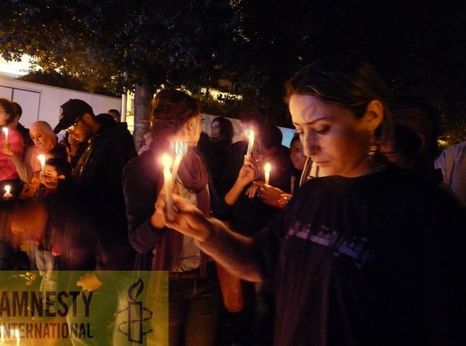Lawyer on trial at military court

Najet Laabidi is a defense lawyer in several cases of torture in Tunisia, including the case of “Barakat Al-Sahel”, which relates to the torture of 244 soldiers accused of planning an alleged coup against President Ben Ali in 1991. The complaints filed by the victims in 2011 were against former President Ben Ali, the former Minister of the Interior, the former Head of National Security, and the former Directors of State Security, accused of crimes of abuse of power and torture, resulting in handicaps and death.
Najet was first sentenced to six months imprisonment by the Tunis Court of First Instance for “accusing public officials of crimes related to their duties without providing evidence”, under Article 128 of the Penal Code. The charge was filed by a judge who claimed that Najet Laabidi made unsubstantiated, defamatory statements after she made a statement outside of the military court warning of the persistence of corruption in the judicial system. The video of her speech was uploaded to YouTube and was widely shared on Facebook. She was only informed of this conviction on 24 April 2017. She immediately appealed the initial verdict, but on 10 May 2017 the conviction and appeal were upheld, again in absentia.
Najet Laabidi’s case is one example of a larger pattern of increasing restrictions on freedom of expression in Tunisia. Amnesty International has documented a number of cases of individuals who were prosecuted based on speech deemed critical of the authorities. The prosecution of persons for expressing criticism to state institutions is incompatible with Tunisia’s obligation to respect the right to freedom of expression, under Article 19 of the International Covenant on Civil and Political Rights, and with the provisions of the Tunisian Constitution. Provisions in Tunisian law that allow for criminal prosecutions of people for legitimate speech include articles in Penal Code, the Telecommunication Code, Press Code, the Military Justice Code, and the Anti-Terrorism Law.
Similar cases include those of Parliamentarian and blogger, Yassine Ayari, who was sentenced to 16 days in prison in March 2018 in his absence by military court, for a post on Facebook published on 27 February 2017, in which he mocked the appointment of a senior military commander.
Since 2011, at least ten civilians have been tried before military courts in cases related to the expression of opinions, usually for criticising the army or state officials. In September 2016, a military prosecutor charged Jamel Arfaoui, an independent journalist, with “undermining the reputation of the army”, for an article he wrote on a news website.
Social Media
President of the Republic Kais Said
Facebook
Twitter: @KaissSaide
- Downloads
- Download in PDF
- Download in Word